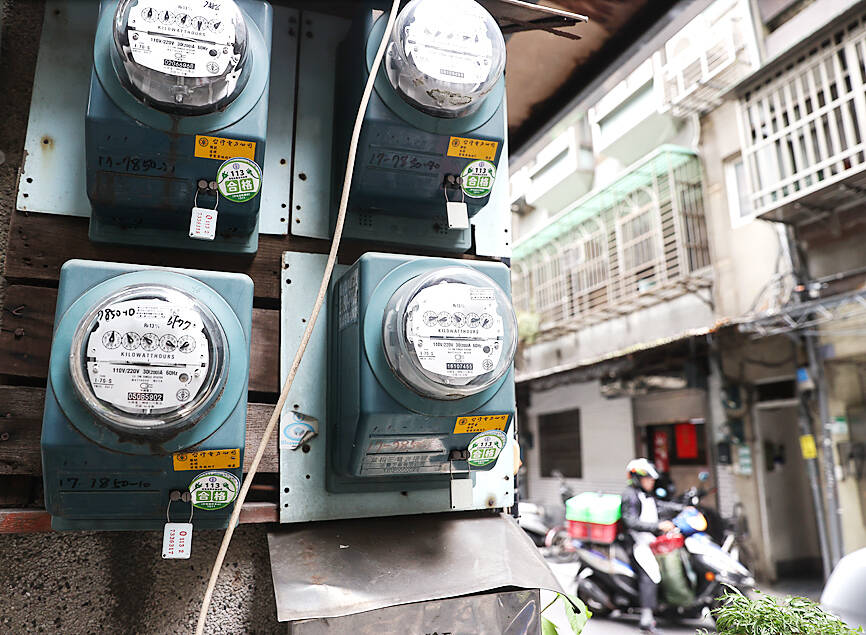The Ministry of Economic Affairs yesterday unexpectedly kept electricity rates unchanged amid concerns that global tariff hikes and geopolitical tensions have been creating economic uncertainty and price instability.
The ministry would instead continue to seek to have a NT$100 billion (US$3.02 billion) subsidy reinstalled by the legislature to help Taiwan Power Co (Taipower, 台電) stay afloat, Deputy Minister Lai Chien-hsin (賴建信) said.
“Members of the electricity price review committee did not talk much about rate adjustments, but focused their attention on the volatile international economic picture,” Lai told a media briefing that was delayed by one hour.

Photo: CNA
The decision came as a surprise, as the ministry had earlier hinted at an increase of 6 to 8 percent for different users, in line with growing international fuel costs.
US President Donald Trump on Wednesday announced a 25 percent tariff on imported vehicles starting on Thursday next week. He has also pledged to announce on Wednesday next week more extensive tariffs to address US trade imbalances with the rest of the world.
Tariff hikes would drive up production costs and inflationary pressure, while slowing the global economy, Lai said, adding that Taiwan would not emerge unaffected given its export-reliant economy.
The electricity rate freeze would cause NT$50 billion in losses for Taipower this year, he said, adding that the state-owned utility had posted cumulative losses of NT$422.9 billion in December last year.
The company has been operating at a loss to support the government’s price stabilizing efforts, he said.
Electricity price hikes have consistently fueled inflationary expectations and last year prompted the central bank to raise interest rates in March to subdue such expectations.
The monetary policymaker last week refrained from further raising interest rates on concerns that Trump’s tariff threats have already weakened consumer confidence and cast a shadow over the global economy.
The TAIEX plummeted 5.07 percent this month while the local currency depreciated against the US dollar, official data showed, as foreign portfolio managers slashed their holdings in emerging markets, including the local bourse.
Lai said it is unfair to blame Taipower for incurring losses, as the company has limited electricity price hikes to industrial and commercial users, while leaving prices for households largely unchanged to tame inflation.
That is why domestic electricity prices rose moderately relative to the steep hikes in South Korea and European countries after Russia invaded Ukraine in 2022, Taipower president Wang Yao-ting (王耀庭) said.
The ministry would ask Taipower to improve its financial standing through belt-tightening measures, while it continues to negotiate with the legislature, Lai said.
The deputy minister dismissed speculation that Taipower’s losses are related to the nation’s policy of retiring nuclear power and increasing the ratio of renewable energy sources.

Taiwan will prioritize the development of silicon photonics by taking advantage of its strength in the semiconductor industry to build another shield to protect the local economy, National Development Council (NDC) Minister Paul Liu (劉鏡清) said yesterday. Speaking at a meeting of the legislature’s Economics Committee, Liu said Taiwan already has the artificial intelligence (AI) industry as a shield, after the semiconductor industry, to safeguard the country, and is looking at new unique fields to build more economic shields. While Taiwan will further strengthen its existing shields, over the longer term, the country is determined to focus on such potential segments as

UNCERTAINTY: Innolux activated a stringent supply chain management mechanism, as it did during the COVID-19 pandemic, to ensure optimal inventory levels for customers Flat-panel display makers AUO Corp (友達) and Innolux Corp (群創) yesterday said that about 12 to 20 percent of their display business is at risk of potential US tariffs and that they would relocate production or shipment destinations to mitigate the levies’ effects. US tariffs would have a direct impact of US$200 million on AUO’s revenue, company chairman Paul Peng (彭雙浪) told reporters on the sidelines of the Touch Taiwan trade show in Taipei yesterday. That would make up about 12 percent of the company’s overall revenue. To cope with the tariff uncertainty, AUO plans to allocate its production to manufacturing facilities in

COLLABORATION: Given Taiwan’s key position in global supply chains, the US firm is discussing strategies with local partners and clients to deal with global uncertainties Advanced Micro Devices Inc (AMD) yesterday said it is meeting with local ecosystem partners, including Taiwan Semiconductor Manufacturing Co (TSMC, 台積電), to discuss strategies, including long-term manufacturing, to navigate uncertainties such as US tariffs, as Taiwan occupies an important position in global supply chains. AMD chief executive officer Lisa Su (蘇姿丰) told reporters that Taiwan is an important part of the chip designer’s ecosystem and she is discussing with partners and customers in Taiwan to forge strong collaborations on different areas during this critical period. AMD has just become the first artificial-intelligence (AI) server chip customer of TSMC to utilize its advanced

While China’s leaders use their economic and political might to fight US President Donald Trump’s trade war “to the end,” its army of social media soldiers are embarking on a more humorous campaign online. Trump’s tariff blitz has seen Washington and Beijing impose eye-watering duties on imports from the other, fanning a standoff between the economic superpowers that has sparked global recession fears and sent markets into a tailspin. Trump says his policy is a response to years of being “ripped off” by other countries and aims to bring manufacturing to the US, forcing companies to employ US workers. However, China’s online warriors